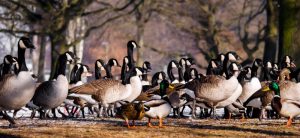Bird flu
 Kent has earned a hard-won reputation for tough and effective biosecurity to protect plant, animal and human health.
Kent has earned a hard-won reputation for tough and effective biosecurity to protect plant, animal and human health.
Avian influenza (or bird flu) has recently been confirmed in wild birds in Dorset and Warwickshire, with an ‘avian influenza prevention zone’ now declared covering England.
It is vital that we all remain vigilant and report any wild birds found dead without obvious cause (especially wildfowl such as swans, geese and ducks) to the Defra helpline on 03459 33 55 77.
Any unexplained deaths amongst captive birds, such as poultry or gamebirds, should also be reported to the Animal and Plant Health Agency on 03000 20 03 01.
For further information please contact Tony Harwood (Principal Resilience Officer)
Email Tony Harwood
emergency.planning@kent.gov.uk
For advice and to report issues to KCC Trading Standards contact: Citizens Advice consumer service
- Online: www.citizensadvice.org.uk/consumer/
- by phone: 03454 04 05 06 (Monday to Friday from 9am to 5pm)
Kent County Council 18 January
http://mailchi.mp/9e58280e91ba/avian-influenza
Public health
Public Health England advise the risk to public health from the H5N8 strain of bird flu is very low.
www.gov.uk/government/collections/avian-influenza-guidance-data-and-analysis
Some strains of avian influenza can pass to humans, but this is very rare. It usually requires very close contact between the human and infected birds. There have never been any recorded cases of H5N8 in humans.
The Food Standards Agency has said the disease poses no food safety risk for UK consumers. Properly cooked poultry and poultry products, including eggs, are safe to eat.
www.food.gov.uk/news-updates/news/2016/15834/fsa-advice-about-avian-bird-flu
If you employ people who work with poultry or work with poultry yourself, you can also read Health and Safety Executive advice on protecting workers from avian influenza
www.hse.gov.uk/biosafety/diseases/influenza.htm
Department for Environment, Food & Rural Affairs
Animal and Plant Health Agency
Information about avian influenza on gov.uk
www.gov.uk/guidance/avian-influenza-bird-flu
If you keep birds
advice for people keeping just a few birds (more…)




